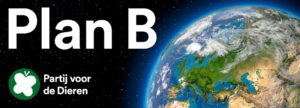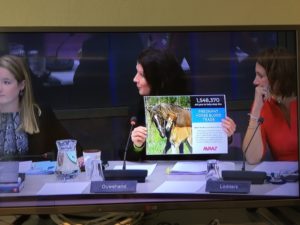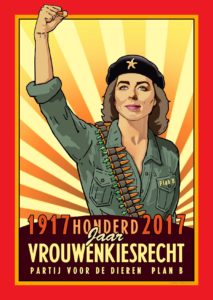وورلدلوگ 23 يناير 2017
لم يبقى الكثير حتى بداية التصويت في هولندا من جديد. 15 مارس سيتم إجراء الانتخابات الوطنية للبرلمان. وبالطبع يشارك أيضا الحزب من أجل الحيوانات! سنقوم في الأسابيع القادمة بحملات انتخابية مكثفة وتعريف الناس ببرنامجنا الإنتخابي “الخطة ب”، لأنه لا وجود لكوكب ب.
وللمرة الثانية يشرفني أن أكون رئيسة لائحة المرشحين للحزب من أجل الحيوانات. وفي الوقت القادم ستقرأ المزيد في مدوناتي الإلكترونية (وورلدلوگ) عن حملتنا وكافة الإجراءات التي نضطلع بها. بالنسبة للوقت الحالي يمكنك قراءة مقدمة عن برنامجنا الإنتخابي الخطة ب هنا
البرنامج مترجم كليا باللغة الإنجليزية كذلك، ويمكن قراءته هنا.

وبفضل عريضة شارك فيها كم هائل خلال الأسبوع الماضي، حدثت ضجة الجونادوتروبين (أو المحرض التناسلي PMSG). وهو هرمون في دم الخيول الحوامل يتم استخدامه في صناعة الماشية الهولندية والألمانية لجعل الحيوانات أكثر خصوبة. وللحصول على هذا الهرمون يتم تصريف كميات كبيرة من دم الخيول الحوامل تحت ظروف قاسية.
وقد أثارت مجموعتنا الأوروبية هذا الموضوع في كثير من الأحيان، أنظر هنا
وهنا . بعد الأسئلة البرلمانية للحزب من أجل الحيوانات، ستلتزم الآن الحكومة الهولندية أيضا بالحظر!

خلال أسبوع واحد فقط تم التوقيع على عريضة لحظر PMSG من طرف ما يزيد عن 1.5 مليون مواطن أوروبي.
قبل قرن بالضبط حصلت النساء في هولندا على حق الترشح في الإنتخابات. تكريما لهذه الذكرى، رسم لي الفنان جوست فيركامب البورتريه التالي.

الآن، بعد مرور مائة سنة، لم يكتمل بعد تحرير المرأة. فمثلا، أرباح الرجل والمرأة ما تزال غير متساوية، حتى ولو أن لهما نفس المستوى التعليمي أو القدرات. ففي العديد من القطاعات، ما زالت تسود أخلاقيات العمل التي تجعل من الصعب على النساء (والرجال) التوفيق بين العمل والرعاية.
قطاع السياسة مثلا. في هولندا، لم يصل عدد النساء في البرلمان النصف بعد. فمن بين 17 رؤساء الأحزاب، أكون الرئيسة الأنثى الوحيدة للائحة المرشحين. و على ما يبدو فإن السياسة محتكرة من طرف الذكور، و رغم الإعتراف بالنساء، إلا أن هذه الأخيرة تلعب في الواقع دورا ثانويا.
“السياسة التعبيرية” لحركات التحرر الأولى، هي دائما مصدر إلهامي: التنديد بالإنتهاكات، وجهات نظر المبدئية وجداول الأعمال السياسية تؤثر بشكل كبير. عندما لحقنا البرلمان مع الحزب من أجل الحيوانات لم تكن هناك صلة برعاية الحيوان، لكنه اليوم أصبح موضوع قلق مشترك وعلى نطاق واسع. آمل أن تلحق الكثير من النساء الجدد للبرلمان!
تحياتي الخالصة،
ماريان
It will not be long before elections will take place again in the Netherlands. The national elections for the Lower House of Parliament will be held on 15 March. The Party for the Animals will of course participate as well! We will actively campaign the next few weeks to introduce to everyone our election programme ‘Plan B’ because there is no Planet B.
I am honoured to be the leading candidate for the Party for the Animals again. The coming weeks you will read much about our campaign and all actions that we will carry out, in my Worldlog. The introduction to our election programme Plan B has been translated in all twelve languages of this website. Click here and change of language at “Languages”. The full programme has also been translated into English and can be read here.

Thanks to a petition that was greatly shared, commotion was caused last week about the Pregnant Mare Serum Gonadotropin (PMSG). PMSG is a hormone made of the blood of pregnant mares that is used in the Dutch and German livestock industry among other countries to improve the reproduction of animals. To produce the hormone large volumes of blood are extracted from pregnant mares under severe conditions.
Our European group already raised this subject a few times, see here and here. Following Parliamentary Questions raised by the Party for the Animals, the Dutch government will start to work actively on the banning of PMSG.

In only one week’s time, the petition to ban PMSG was signed by over 1.5 million European citizens.
Exactly one hundred year ago, the women in the Netherlands were given the right to vote. In celebration of this anniversary, the artist Joost Veerkamp made the following portrait of me.

Now, one hundred years later, women’s emancipation has not finished yet. For example, the incomes of women and men are still not equal, not even if they have the same education and capacities. In many branches of industry, there is a work ethic that makes it difficult for women (en men) to combine work and care.
Take politics for instance. In the Netherlands, the number of women in the Lower House is still less than half. Out of 17 party chairmen I am the only female leading candidate. Politics seems to be for men only, where women are tolerated but play a minor role.
Personally, I have always been very inspired by the expressive politics of the first emancipation movements: expose abuses, adopt basic positions, and to have a great impact on the political agenda. Animal welfare was irrelevant at the time that we, with the Party for the Animals, entered the Lower House, but these days it is a broadly shared concern. I hope that many new women will join the Lower House!
Kind regards,
Marianne